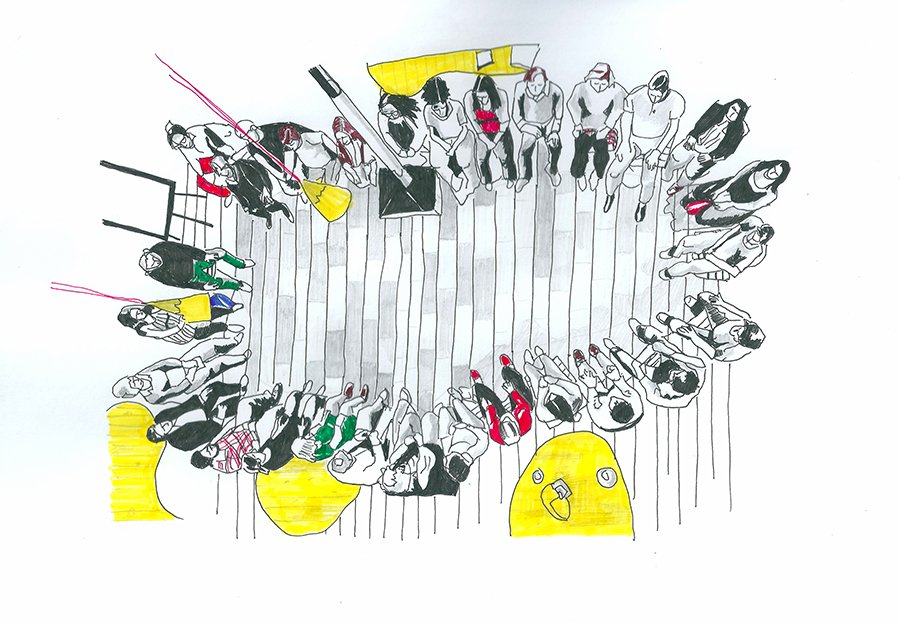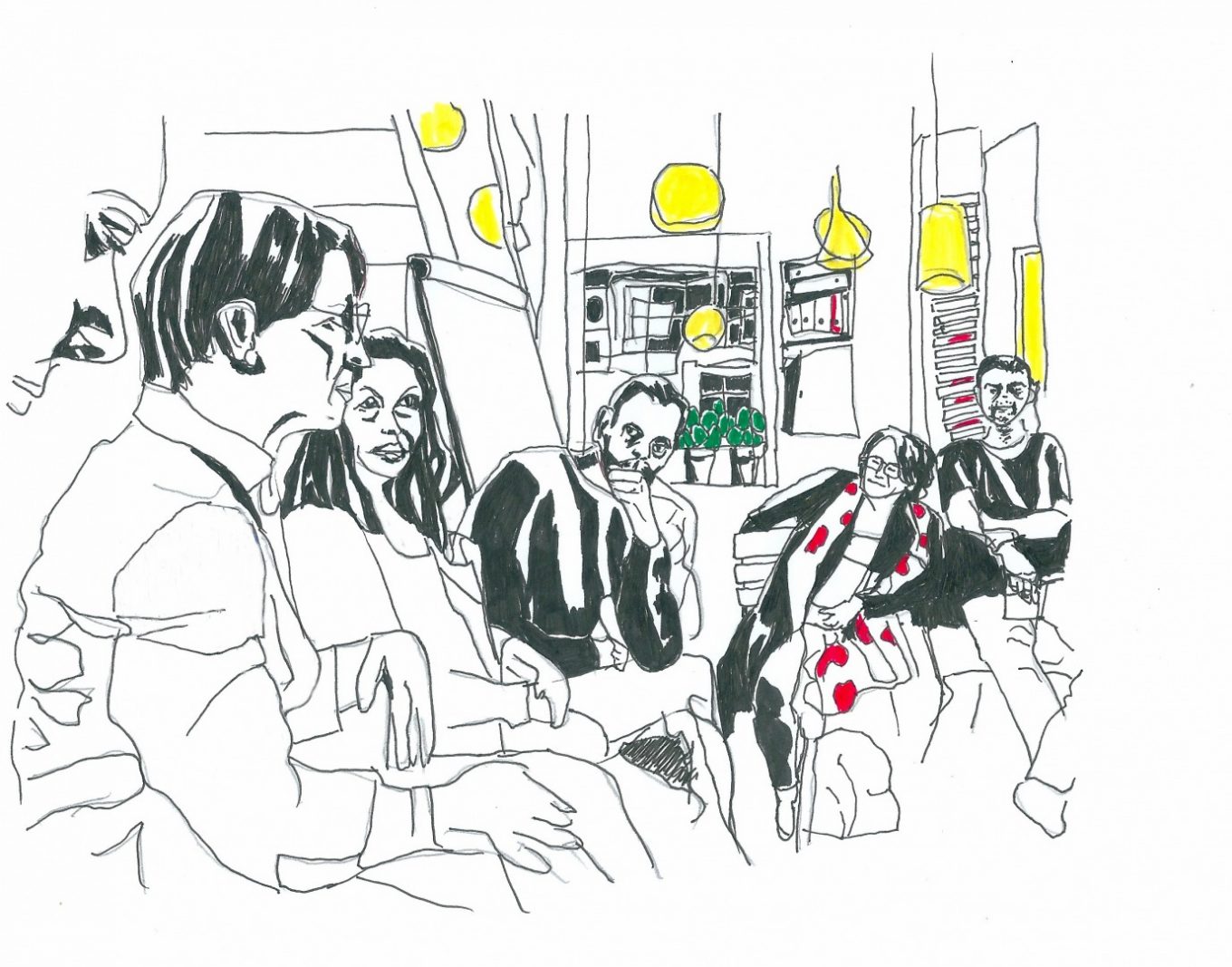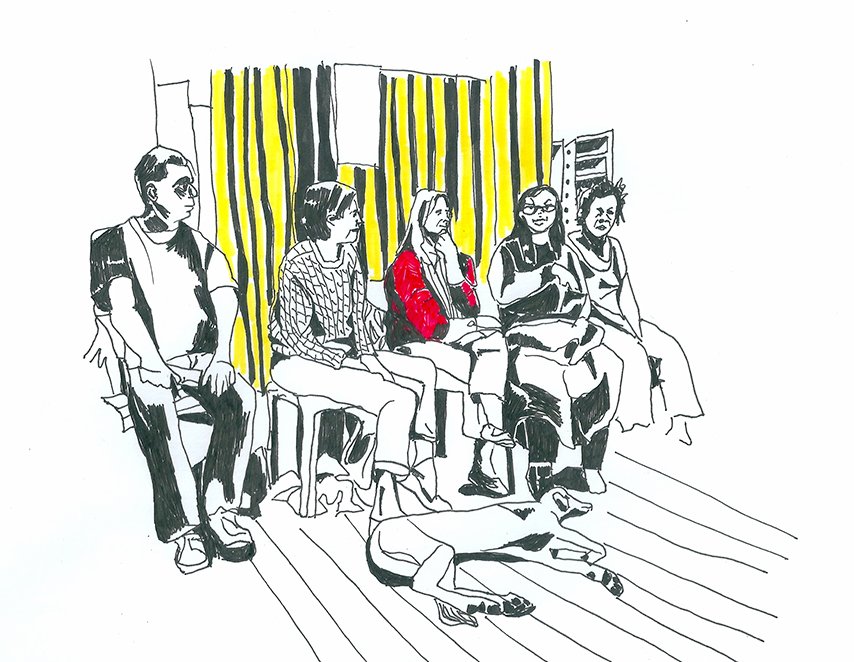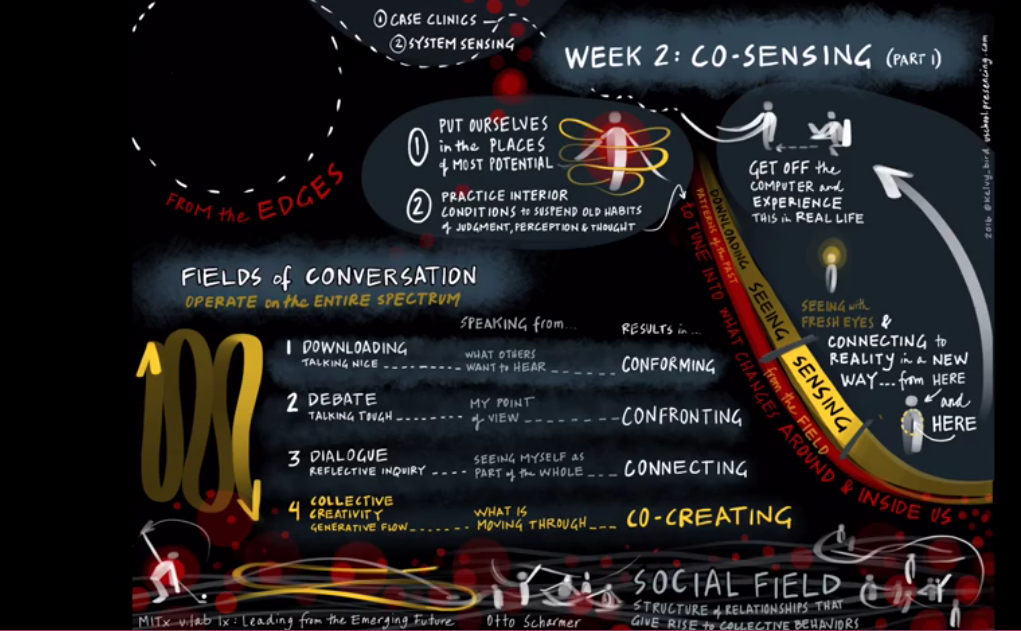
Last September the U.Lab adventure began, with a total of 75,000 participants coming from 190 countries. Delivered by MITx free of charge through the online platform edX (co-founded by MIT and Harvard in 2012), U.Lab: Leading from the Emerging Future is a Massive Open Online Course (MOOC) about Theory U, a method developed by Otto Scharmer, a Senior Lecturer at MIT.
The purpose of U.Lab is to introduce the variable of consciousness into management and the social sciences. U.Lab proposes that the quality of the results that we create in any kind of social system is a function of the quality of awareness that the participants in the system operate from.So the course provides participants with tools to improve their awareness, attention and consciousness in and of the systems in which they work.
As I am part of the U.Lab Hub of Kings Cross Impact hub, located in London, I was able to attend the second meeting of my group last Monday. This is a hub that focuses on the theme of Reinventing Democracy (facilitated by Andy Paice) but that also approaches other areas according to the interests of the participants.
With happiness and excitement I arrived to the beautiful Impact Hub venue, located in Kings Cross, joining the other 30 participants all seating in a somewhat irregular round circle that randomly had the shape of a heart. We were to share stories from our week, to ask questions, clarify any doubts, and collectively reflect about our U.Lab week’s experience.
After an exercise of mindful meditation, we wrote our interests and intentions for the course on a piece of paper, and then shared them loud with the group. The diversity of our interests and intentions was truly amazing. Mostly, the participants mentioned how they were interested about connecting with the self, self improvement, learning about conflict-resolution techniques, reflecting about decision making processes, co-evolution, looking for inspiration and new tools, looking for collaborative and transformative practices, and/or methods of co-creation and self-management.

The group reviewed the main topics of week 2, which are dedicated to co-sensing. According to U.Lab theory we are now initiating the journey down the left-hand side of the U, and co-sensing is the first of three main stages, where we truly feel the field of change. As Otto Scharmer says, Co-sensing basically means:
Go to the places of most potential and listen with your mind and heart wide open.
During the co-sensing phase, one moves beyond downloading the patterns of the past (what we already know) in order to connect with a future reality that wants to emerge. The process is dynamic: on one hand, we connect with the reality that we currently face and on the other, with the emerging reality that is wanting to happen around us and within us. In order to do so, we practice opening our mind and suspending judgment, old habits of perception and thought, in order to really connect with what’s going on around us,and that’s also beginning to change within us. It’s like noticing the tiny shoots of an approaching spring on a cold and wintery day – you need to finely attune your attention to see this emerging future.
The two main processes taught by U.Lab that help us sharpening the process of co sensing are stakeholder interviews and learning journeys, such as empathy walks.
Stakeholder interviews
With the stakeholder interviews, participants are challenged to make an interview with their bosses, peers, employees and ask core questions, to truly empathize and understand their point of view. Those interviews supposedly enable us to practice deep listening. With deep listening, one shifts the inner place from where our listening and our attention originates. We are “paying attention to paying attention” and so we drop judgements, criticism and any attempts to find solutions and fix the problems we are hearing about.
Some sample questions one can ask, in the stakeholder interviews, could be:
- What is your most important objective, and how can I help you realize it? What do you need me for?
- What criteria do you use to assess whether my contribution to your work has been successful?
- If I were able to change two things in my area of responsibility within the next six months, what two things would create the most value and benefit for you?
Empathy Walks
We also discussed our empathy walks, where one tries to find an unknown person that is radically different from us, and engage in a conversation with them, attempting to really listen what the other person is trying to say. In our group these walks were considered to be a bit challenging. I haven’t yet taken mine, for example. One participant shared how he felt that in London it was difficult to just walk to a stranger, as this was a very impersonal and “mind your own business” kind of city. He was afraid people wouldn’t understand why he was doing it. Someone else mentioned that even if empathy walks are slightly complicated in the beginning, by doing them, it becomes easier. Another participant shared a beautiful example of an empathy talk, where she creatively slightly altered the parameters of the exercise. She went for a walk with her partner to a park, and at turns, they embodied the various beings of the park trying to imagine what they would be saying through role playing. If they were a tree, or a bird, what would they be saying about the world? “So many airplanes in the air, no space for us… we should bomb them!” she said, as if she was a bird flying by. We all laughed! Their creative take on U.Lab’s empathy walk was heartening and funny and as if empathizing with her, a dog decided to take a nap at her feet!

We then split into small groups, to chat and get to know a little bit more about each other. Our conversations in little groups reminded me of what I had learned on the online course about social fields and the four types of conversation: downloading, debate, dialogue and generative creativity. With amazement, I could identify the various types of conversations in my group. If it can be shocking to realize how one automatically either tries to be nice or engages in secret judgment of what others say, just to become aware of that, really is the first step to truly dissolve the boundaries that separate us, and to then engage in comments of generative creativity. I guess it takes practice to engage in sustained true connection, and generative dialogue. But the seeds of change are sown and it is fantastic to be part of a group of change-makers, actively working for a more loving and creative connection with each other.

Finally, we prepared for the coaching circles of the coming week, by randomly dividing ourselves in various groups of five, some dedicated to the topic of reinventing democracy, and others working on a variety of their own particular projects.
More next week!

Maria Fonseca is the Editor and Infographic Artist for IntelligentHQ. She is also a thought leader writing about social innovation, sharing economy, social business, and the commons. Aside her work for IntelligentHQ, Maria Fonseca is a visual artist and filmmaker that has exhibited widely in international events such as Manifesta 5, Sao Paulo Biennial, Photo Espana, Moderna Museet in Stockholm, Joshibi University and many others. She concluded her PhD on essayistic filmmaking , taken at University of Westminster in London and is preparing her post doc that will explore the links between creativity and the sharing economy.









